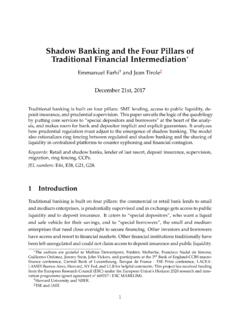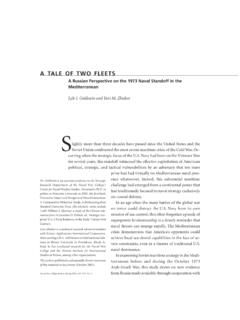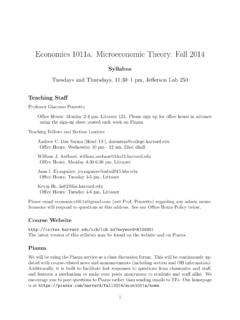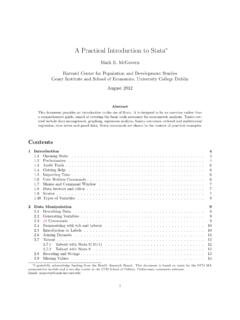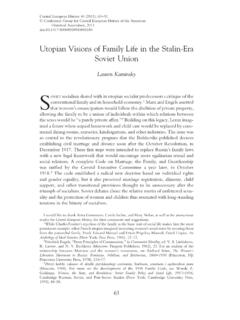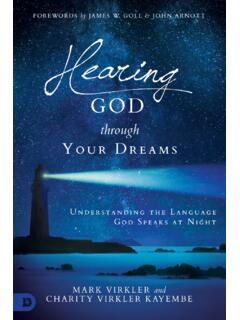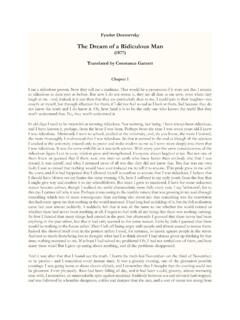Transcription of Lecture 2: Descartes’ Dreaming Argument
1 Phil. 159: Epistemology Sept. 6, 2018. Lecture 2: descartes ' Dreaming Argument I. descartes ' First Meditation A quick and dirty overview of the main dialectic of the First Meditation: The method of doubt (top to bottom of p. 12). descartes begins by observing that he has, over the course of his life, come to believe many false things. So, in order to establish a foundation for the sciences that is stable and likely to last, he resolves to sort through his beliefs and extirpate those of them that may be called into doubt. Fallibility of the senses (bottom of p. 12 to top of p. 13). Many of our beliefs are acquired through sense perception, but descartes notes that our senses sometimes deceive us when we are in poor perceptual conditions (the object is far away, the lighting is low, and so on).
2 This gives us good reason to distrust some, but not all, of our perceptual beliefs. The Dreaming Argument (middle of p. 13). But then descartes recalls that sometimes he has had perceptual experiences while Dreaming that are exactly like those he has had while awake. Reflecting on this, descartes concludes that there are never any sure signs by means of which being awake can be distinguished from being asleep. This leads him to doubt almost everything that he believes on the basis of sense perception, including his belief that he now has hands. (More on the exact details of the Dreaming Argument below.). The painting analogy (bottom of p. 13 to middle of p. 14). However, there are still a number of beliefs that descartes thinks are untouched by the Dreaming Argument .
3 Perhaps, just as painters must model their paintings on general kinds of objects that really exist, our dreams must take their material from the sorts of things that we have encountered while awake. If this analogy is successful, no reason has yet been found to doubt such general beliefs as that there are physical objects, that there are places in space where these things might be, that 2 + 5 = 7, etc. The deceiving God hypothesis (middle to bottom of p. 14). descartes ' next line of thought unseats even those beliefs. descartes countenances the possibility that there might be an all-powerful God who ensures that we are always deceived, even about the most general of beliefs. There are two ways this hypothesis might go: intervening God hypothesis: God intervenes to give us false beliefs.
4 Defective design hypothesis: God created us in such a way that we are always deceived. To the objection that a supremely good God would never let us be deceived like this, descartes replies: if it is compatible with God's benevolence that he allow us to be deceived sometimes, surely it is compatible with his benevolence that he allow us to be deceived all the time. Transition from doubt to rejection (top to middle of p. 15). Even though it is more reasonable to believe that to deny the opinions about which he has raised worries, descartes proposes to reject them in order to carry through his project to its completion. The evil demon hypothesis (middle to bottom of p. 15). So that he doesn't slip back into his old ways of thinking, descartes makes himself suppose that some malicious demon of the utmost power and cunning is doing all it can to deceive him.
5 II. The Dreaming Argument Let's look more closely at descartes ' Dreaming Argument . (Or, rather, let's look more closely at one common interpretation of that Argument .). descartes ' first step appears to involve making the following inference: (1) Sometimes when you're Dreaming , you can't tell whether or not you're Dreaming . (2) So, even when you're awake, you can't tell whether or not you're Dreaming . This is a significant move: (2) is a stronger claim than (1). It might seem that, in making this move, descartes is assuming the following to be a generally valid inference: (b) When you're in the bad case, you can't tell whether you're in the good or the bad case. (g) So, when you're in the good case, you can't tell whether you're in the good or the bad case. However, this sort of inference is not always legitimate.
6 (Can you think of a counterexample?). descartes thinks that there is something special about the connection between the specific case of Dreaming that he is considering (= the bad case) and the corresponding case of being awake (= the good case) that makes (2) follow from (1). What is that connection? It's that one has the exact same course of experience in both cases: from the inside, the two cases are indistinguishable. So we can add an extra premise to the Dreaming Argument to represent its dependence on this assumption: (1) Sometimes when you're Dreaming , you can't tell whether or not you're Dreaming . (1a) Any course of experience you can have while awake can also be had while having one of those sorts of dreams . (2) So, even when you're awake, you can't tell whether or not you're Dreaming .
7 From (2), it seems that we can conclude the following: (3) So, you can't know that you're not Dreaming . digression: There is a stronger and a weaker interpretation of (3). According to the weaker interpretation , (3) means You can't know that you're not now Dreaming .. (That is, for each course of experience you have, you can't tell whether or not that course of experience is a dream.). According to the stronger interpretation , (3) means You can't know that you're not always Dreaming . (That is, you can't tell whether or not all of your experiences are dreams .). (Compare: For each painting, you can't tell whether or not that painting is a forgery vs. You can't tell whether or not all paintings are forgeries. ). Next Lecture we'll discuss which version of (3) is needed.
8 Returning to the Dreaming Argument , descartes ' final premise is the plausible claim that if you can't rule out the possibility that you're Dreaming , you can't use perception to gain knowledge of the external world: (4) In order to know anything about the external world on the basis of perception, you have to know that you're not Dreaming . But from (3) and (4), we can infer the following skeptical conclusion: (5) So, you can't know anything about the external world on the basis of perception.


